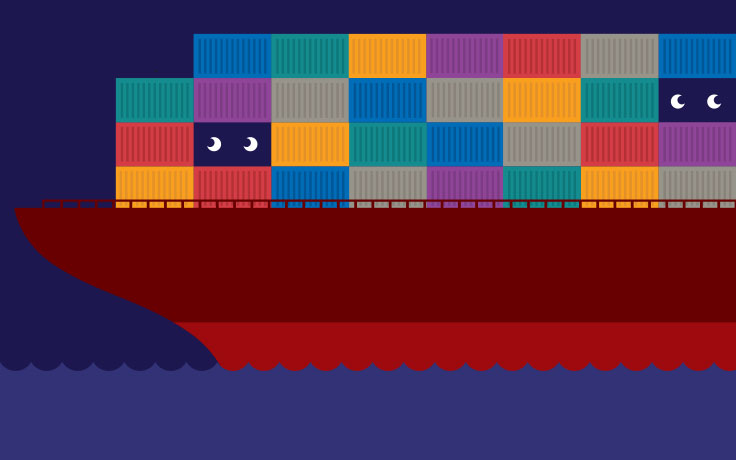BEFORE ATTENDING GRADUATE SCHOOL, Margaret Peters spent six months in Qatar modernizing its court system from pen and paper to computers. The experience was pivotal.
“It was 90% migrants,” she said. “I worked with Egyptians, Sudanese, Somalis, Jordanians and Pakistanis. I almost never worked with a Qatari. It was super weird, coming from the United States.”
Peters was so intrigued by the multinational workers who had come to that tiny nation, on the northeast coast of the Arabian Peninsula, that she switched her grad school focus from international development to migration. It would grow into a sustaining passion.
Among other things, she learned that immigration and trade are pieces of a complex foreign-policy puzzle. For the past decade, she has been unraveling that complexity. Only rarely have trade, immigration and the ability of companies to move to other countries for cheaper labor all increased or decreased in tandem.
“When I was in grad school, I was thinking about how trade was more restricted in the 19th century but is really open today,” Peters said. “We would have tariffs of 20, 30, 40 percent on goods. Today we have very few tariffs, and they are not very high. But we saw the reverse with immigration. In the 19th century, anybody could come. Today there are many more rules.”
We spoke in her campus office, where she had been answering emails from students beset by midterm nerves. Peters, 37, an assistant professor of political science at UCLA, said she had been intrigued at Stanford, where she earned her Ph.D., by the perplexing history of trade and the immigration of low-skilled workers — and, more broadly by the political economy of migration. It became the focus of her award-winning dissertation as well as her forthcoming book, Trading Barriers: Immigration and the Remaking of Globalization.
Peters’ expertise is particularly timely. She is studying trade and immigration when both are under intense political pressure from deeply divided interests. Immigration and trade policies, she said, are helping to drive the disruptive politics of a rapidly changing world.
Trade Confronts Populism
Peters could be mistaken for a student. She is thoughtful and informal; she goes by Maggie. She speaks with range and ease about her field and laughs at ironies as she draws on her expansive knowledge. Her appreciation for political issues dates to high school, when she took an Islamic history class and learned some Arabic. She earned her undergraduate degree in political science at the University of Michigan. Before going to graduate school, she worked for a Washington, D.C., consulting firm, which sent her to Qatar. At Stanford, she earned not only her doctorate in political science but also a master’s degree in economics. She taught at Yale and at the University of Wisconsin-Madison before coming to UCLA last year.
Trade and immigration are highly charged issues that have been central to the platforms of populist, ethno-nationalist candidates in Europe and Great Britain and at the heart of Donald Trump’s victory in his campaign for president of the United States. At the same time, hard-right, nationalist, anti-immigrant movements have swept through nearly every Northern European country, including Sweden.
“The breakdown of Syria has created this huge migration crisis,” Peters said. “Europeans have taken in maybe 1 million of the 11 million Syrian refugees, while Turkey, Lebanon and Jordan have taken the rest. I am sure those countries [look at Europe and] are like, ‘What are you complaining about?’”
Pressure from the refugees, combined with migration from European Union countries in Eastern Europe, seemed threatening in British communities where there was generalized economic anxiety over diminishing jobs, Peters said. When even a few Polish plumbers showed up in some British villages, they experienced anti-immigrant attitudes. Small British towns voted to leave the EU, she said, like Rust Belt towns in the United States voted for Donald Trump.
“If you look at the voting on Brexit [the June decision by the British to exit the EU], there were all these commentators talking about [either] immigration or trade,” Peters said. “But, as I argue in my book, those things are closely tied together.”
Areas in Britain decimated by trade voted for Brexit by larger margins, she said. That should not have been surprising, she added, because those areas do not have businesses with substantial needs for immigrant labor. “As long as business doesn’t help keep nativists in check, the nativists win.
“Nativists have always been around,” Peters said, “but for the most part, people are more tolerant of immigrants today than they were 100 years ago.” The U.S. Immigration Act of 1917, for example, was known as the Asiatic Barred Zone Act and as the Literacy Act, the latter because it imposed a literacy test. It was the strictest immigration law of its time. The act barred “undesirables,” including “idiots, imbeciles, epileptics, alcoholics, poor, criminals, beggars and any person suffering attacks of insanity….”
By contrast, a Pew Research survey late last year found that 63% of Americans said immigrants strengthen the United States, while just 27% described them as a burden. Meanwhile, just 52% of Britons voted to leave the European Union while 48% voted to remain.
“What you are seeing is a very vocal, relatively small set of the population that really cares about this,” Peters said.
***INSERT***
Businesses and their labor needs are the primary drivers of immigration policy, Peters said. Without business lobbyists or, in many European countries, social economic councils and employer associations that lobby for labor needs, policymakers put restrictions on immigration, she said. “Businesses really do have an outsized voice, in part because they have a lot of money, but also because they have jobs. It’s like Bill Clinton said: ‘It’s the economy, stupid.’ All politicians, even ones in autocracies, have to respond to that.”
When Peters researched immigration and trade policies of 19 nations from the 19th through the 21st centuries, she found that both trade policy and the ability of businesses to move to countries with cheaper labor directly affected immigration policy in labor-scarce countries. Political support for immigration of low-skill workers relies upon restrictions on both trade and the ability of companies to decamp to nations with cheaper laborers.
Her research showed that policymakers have either eased immigration and restricted trade and business mobility or vice versa. There might be snapshots in time when all three were open, she said, but those periods never lasted. Open trade and freedom for businesses to move for cheaper labor usually undercut support for immigration.
Peters’ findings counter what some economists argue, that it doesn’t matter what form openness takes: Whether it’s goods or people, capital or corporations, it has the same effects.
“But that is not what happens,” Peters said.
Except when Nordic countries joined the European Union, the EU always opened trade and cross-border investment first, then opened migration later, she said. The idea was that wealthier countries would invest in poorer countries, create more jobs and raise wages — and low-level workers would stay at home.
But free trade upset that model, Peters said. Low-skilled immigrant labor-intensive companies moved to cheap labor countries to compete with an overproduction of products flooding the market from China or other countries. Domestic companies unable to compete closed down, she said, or mechanized to cut labor costs, shrinking low-skilled jobs even more.
At the moment, Britain is grappling with how to leave the European Union. Withdrawal negotiations will include whether to guarantee the right of nearly 3 million EU nationals to continue to live in the United Kingdom, an outcome that would affect the 1.2 million U.K. nationals living in Europe. Brexit is expected to take two years and cost U.K. taxpayers $120 billion. Peters said it will be difficult for Britain to get the exit deal it wants, which would be to close its borders to EU migrants but keep trade and cross-border investment open to maintain a robust economy.
“EU members like Romania and Poland,” she said, “for whom half the benefit of being in the EU is having [emigrant] workers send remittances back home…, may say, ‘No, you cannot trade with us unless you take our people.’”
Trade Deals and Migration
Forging a balance of policy in trade, immigration and company mobility is not how most countries approach policymaking, Peters said. “Policymakers almost don’t even think of immigration policy as foreign economic policy.” Instead, they see immigration as a matter of domestic policy. The only time they consider it otherwise, she said, is when they think making trade agreements with another country will result in that country sending fewer job-seeking migrants.
“The whole thing behind NAFTA [the North American Free Trade Agreement among the United States, Canada and Mexico],” she said, “was that if we gave Mexico this trade deal and Mexico developed, then fewer Mexicans would come to the United States.”
But migration, Peters said, has always been a way for people to escape poverty and death. For centuries, it has allowed millions to flee famine, drought, persecution and war. Immigrants are a small minority in most of their host countries and have generally benefited those countries by bolstering economic growth, increasing innovation and bringing rich cultural change.
At the same time, she said, migrants have spread democratic ideals to their home countries, sent remittances back and increased trade networks, foreign investment and foreign aid. Migration is the most powerful and effective means of development for less wealthy nations, she said, but it is nowhere on most countries’ agenda for development or foreign policy.
Governments should approach immigration as foreign economic policy, Peters said, rather than domestic policy alone, affected by domestic politics and economic interests. Similarly, immigration advocates need to create new and broader coalitions based on mass political support, she said, rather than narrow economic interests, which are the province of business lobbyists and commercial coalitions.
More simply, immigration proponents would do well to reframe immigration as a human right, Peters said. “Think of all the great civil rights movements,” she said. “As feminists, we don’t win by saying, ‘As feminists, we can make a lot of money for our country and our families.’
“We do it by appealing to norms of fairness.”

























Comments